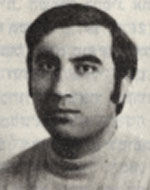Elias (Eli), son of Sa’ida and Sasson, was born on April 8, 1943, in Baghdad, Iraq, and immigrated to Israel with his family in 1951. He attended an elementary school in Baghdad and later in the Magdiel transit camp, Dvir “family in Ramat Gan After his family immigrated to Israel, his family lived in the Magdiel transit camp, where the housing conditions and the economic situation were difficult, and in order for Eli to study in a good school and to increase welfare, they sent him to his grandmother’s home in Givatayim. In 1953, the family moved to Ramat Hen, where Eli was a comfortable child and was not one of the most prominent pupils in elementary school, After graduating from elementary school, he attended high school in the evening, because he wanted to work to help support the family, and he combined his studies with a job in the survey department in Tel Aviv, As a clerk in the drawings department, he purchased various items for the house, and when he was a student in elementary school, he stood out as a sportsman, he was very fond of sports and played soccer very much during his free time, and he also enjoyed sports, soccer, basketball and swimming. Other results. He was always willing to help anyone: friends, neighbors, and people on his way. He was known for his honesty and impartiality, for every person treated with respect and consideration. At his place of work he was very popular and was asked to return to work there, after completing his regular service. Elias was drafted into the Israel Defense Forces in early February 1961. After completing his basic training, he was appointed to the rank of sergeant and was appointed as a sergeant, He was assigned to reserve duty in the Armored Corps, and was assigned to serve as a non-commissioned officer in the Armored Corps, serving in the battles of the Six Day War. After his discharge he returned to his work in the measurement department, but he did not like the office work and decided to look for work that had more movement and activity. He took a cooling course and started working at the “empa” as a refrigeration technician, loved the work outside and the contact with people. In time he was even elected as a member of the “Ampa” workers’ committee. He took his position very seriously, contributed his time and fought loyally for workers’ rights. In 1971 he married his girlfriend Aviva and lived with her in Ramat Gan, not far from his parents’ home. He maintained close contact with his parents and sisters, and after his father died, he helped his mother a lot and served as the head of two families. Eli was very proud of his daughter and the day she took her first steps was one of the happiest in his life. On the eve of Yom Kippur, when the state of alert was felt, Eli prepared his belongings and was ready to leave before he was called. He tried to reassure his family that nothing would happen to him, and even in the postcards, which he made sure to send from the front every day, tried to ease their concern. He was sent with his unit to the Sinai front and on October 21, 1973 he was hit and killed in an attack on the Hamutal compound in the central sector of the Suez Canal, which hit his car. For a long time he was absent and only nine months later, in July 1974, his body was returned and he was brought to eternal rest in the cemetery in Holon. He left behind a wife and daughter, a mother and two sisters. After his fall, he was promoted to First Sergeant. In a letter of condolence to the bereaved family, the unit commander wrote: “Your son was a model bread in the difficult battle in which he participated.”
